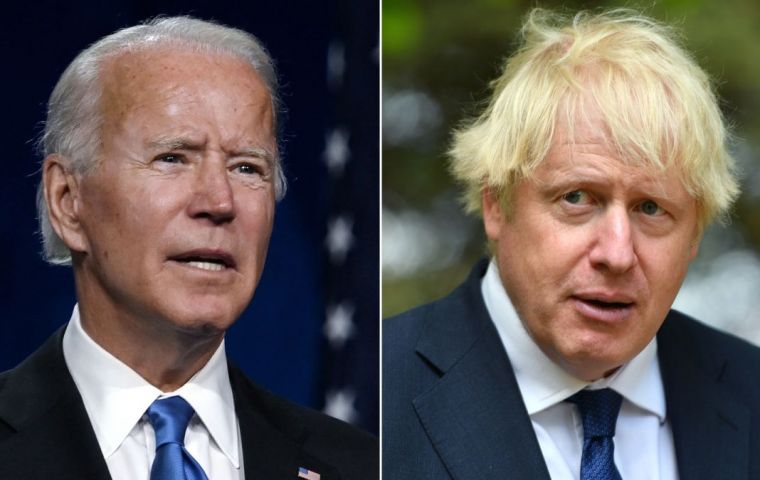MercoPress. South Atlantic News Agency
UK wants to coordinate the development of future pandemic vaccines to 100 days
 This Friday Prime Minister Boris Johnson hosts a virtual meeting of leaders including US President Joe Biden.
This Friday Prime Minister Boris Johnson hosts a virtual meeting of leaders including US President Joe Biden. Britain which holds the presidency of the Group 7 will challenge fellow members to help speed up the development of future vaccines to 100-days. On Friday Prime Minister Boris Johnson hosts a virtual meeting of leaders including US President Joe Biden.
Johnson wants to build on the momentum for a more coordinated approach to future pandemics, including the creation of a global health treaty. He will also encourage leaders to increase their Covax funding, referring to the global initiative that aims to distribute vaccines equitably around the world.
The call will be Mr Biden's first multilateral engagement since he took over from Mr Donald Trump whose unorthodox approach to G-7 meetings often left attempts to build international consensus in disarray.
Boris Johnson wants to seize on the change in US leadership and the trail of destruction left by the Covid-19 pandemic to put three items at the top of the global agenda: health, climate change and a rebound which distributes economic benefits more fairly.
He will kick off that agenda on Friday by promising to share surplus vaccine doses with developing countries and calling for help to develop vaccines more quickly.
“By harnessing our collective ingenuity, we can ensure we have the vaccines, treatments and tests to be battle-ready for future health threats, as we beat Covid-19 and build back better together,” Johnson said in a statement ahead of the meeting.
It took 314 days from the first identification of a Covid-19 cluster in China in December to the first successful vaccine trial results.
Britain hailed that as a huge achievement but said next time it must be done faster, backing a 100-day target previously set out by the Coalition for Epidemic Preparedness Innovations.
“As leaders of the G-7 we must say today: never again,” Mr Johnson will tell the United States, Japan, Germany, France, Italy and Canada. The “majority” of any future UK surplus coronavirus vaccines will be shared with Covax, Mr Johnson’s office said late Thursday in a statement.
UK has already secured more than 400 million doses from seven manufacturers to vaccinate its population of 67 million people. An assessment will be made later in the year to determine what can be donated to Covax, based on supply chain reliability and whether new vaccines are needed to tackle variants or as booster doses in the fall.




Top Comments
Disclaimer & comment rulesCommenting for this story is now closed.
If you have a Facebook account, become a fan and comment on our Facebook Page!